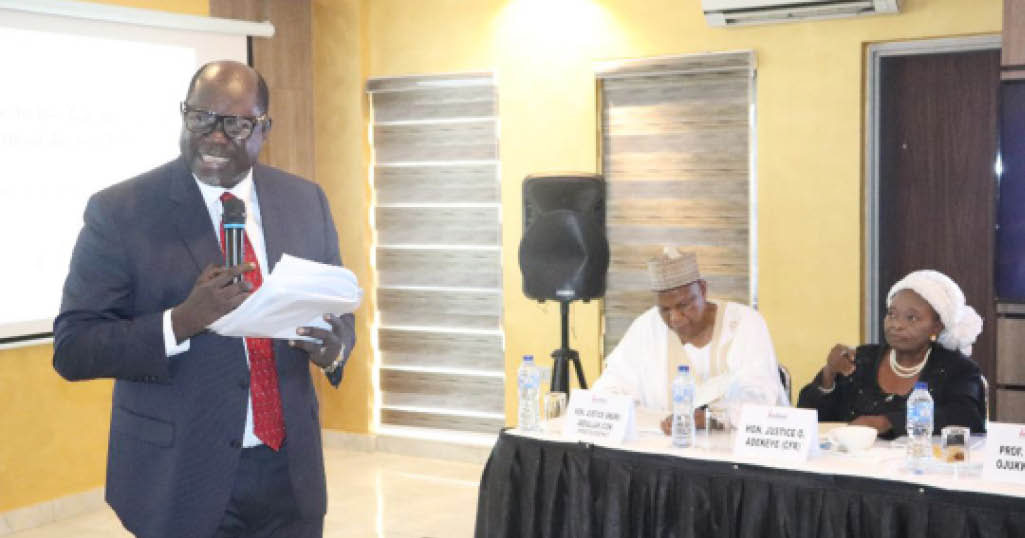Katsina State has produced its own Administration of Criminal Justice Law (ACJL), and presented it for critical reviews from legal experts in Abuja. It joined 28 other states, which have so far adopted the new law in their respective states
Former justices, including former President of the Court of Appeal, Justice Umaru Abdullahi; former Supreme Court justice, Justices Clara Ogunbiyi, Adamu Jauro Olufunlola Adekeye; academics like Professors Ernest Ojukwu (SAN) and Alphonsus Alubo (SAN), and Chief Solo Akume were among the stakeholders who chaired the different sessions in the review of the state-owned law on criminal justice procedure reform.
The ACJA at the federal level was signed into law in 2015. The ‘Explanatory Memorandum’ of the ACJA in page iv states as follows: “This Act provides for the administration of criminal justice system which promotes efficient management of criminal justice institutions, speedy dispensation of justice, protection of the society from crimes and protection of the rights and interests of the suspect, the defendant and victims in Nigeria.”
The Katsina ACJL was reviewed during a retreat for judges of Katsina State judiciary organized by Indent Consulting and Training in Abuja recently. The event centred on how justice sector players in the state can apply the new law which has been described as forward-looking, despite its inherent flaws.
In the introduction, the Chief Judge of Katsina State, Justice M.D. Abubakar said one of the innovations of the law is the community conflict resolution centres set up in the state which have helped to reduce criminality and case congestion.
He said the security challenges in the state made it necessary adopt the community dispute resolution measure, adding that disputes are now resolved by the communities before they get to the court.
Some criticisms of the law
In his review, Prof Alubo said the law did not make provision for several important aspects of modern criminal justice reform. For instance, he said the law did not provide for non-custodial measures and community service. He said Section 259 provides for a pregnant woman sentenced to death to be allowed to wean the child in a government facility, explaining that there are calls that the sentence ought to be commuted to life imprisonment.
Alubo said in Section 232, the law did not make any provision for the protection of witnesses using screens, masks and pseudonyms, but rather protection from being asked some questions. He said the absence of witness protection is not good for a state ravaged by bandits.
The law, according to Alubo, did not also make provisions for visits of magistrates to police cells, and the powers of the Attorney General of the state to prosecute. He said the federal ACJA has provided for who should prosecute, which has taken it away from lay prosecutors and non-lawyers. He said there is absence of provision for witness expenses in a trial.
Alubo said the Katsina law did not make provision for trial on day-to-day in the spirit of Section 396(3) of the federal ACJA. The law provides for only five adjournments in a case. He said some states have provided for judges who have been elevated to higher courts to return to their pending cases on an ad hoc bases to conclude them in the spirit of speedy trial of cases.
He said the law did not provide for criminal records registry, which enables the state to keep bio data of convicts. He said a lot of ex-convicts have gone to destroy evidence of their conviction and sentence.
The expert pointed out the ACJL being a procedural role ought not to introduce cases of unlawful assembly and rioting under a legislation of the state House of Assembly.
Alubo pointed so many things left out such as service of process in 453, and legalization of bondsmen to discourage jobless persons hanging around the courts.
He said the Section 118 of the law in Katsina and other states appear to have legalized the ‘holding charge’ by law enforcement agencies.
Some innovations in the law
Alubo pointed out some good innovations such as admissibility of evidence of preliminary inquiry in Section 228; and admissibility of the evidence of person dangerously ill in Section 235.
Other innovations are found in sections 236 to 237 which provides for evidence where the court sends out a ‘commission’ to any other court where the witness is domiciled along with interrogatories, and “returned to the court that issued it with the depositions of witnesses.”
Section 239 provides for evidence taken abroad by interrogatories through affidavit. It provides that the attendance of such a witness may be dispensed with when interrogatories returned the signed document.
Alubo also described the provision of 240 record of evidence in absence of an absconding witness; and Section 241on the evidence of scientific experts such as medical, physiologists, biologists, pathologist, chemists, as important innovations in the law.
Section 253 constitution of judges with even numbers should be referred to a court with an uneven number of judges like the Sharia Court.
“I have often extolled the ACJA as revolutionary and over the years, I came to the conclusion that I am not wrong in that respect, having worked for and working on ACJL in over 25 states for the Nigerian Bar Association,” Alubo said.
“The ACJL of Katsina State is sui generis, for so many reasons. One commends it for inclusion of the hierarchy of courts like Plateau and Jigawa States and for upgrading the jurisdiction of the courts,” he added. “This is a 21st Century law.”
Speaking on the law, the former PCA, Justice Abdullahi called for the protection of the rights of defendants by judges and judicial officers irrespective of whatever is provided under the law.
The lead consultant, Ibe Ikwechegh said the retreat is to enable stakeholders to adopt strategies to apply the new law and recognize the public policy components without the law being returned to state assembly.




